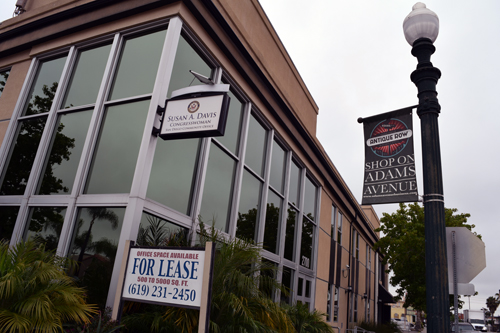
–17th in a series–
Exit 6, Texas Street, San Diego ~ District Office of U.S. Rep. Susan Davis
By Donald H. Harrison

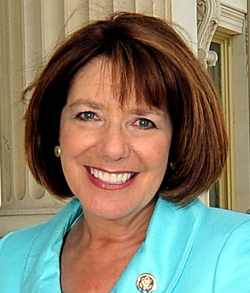
SAN DIEGO –The distance between this city and Washington D.C. is approximately 2,690 miles, or a five-hour jet plane ride. Impractical to go back and forth every day between work in Washington and constituents in their districts, as, say, a member of Congress from Maryland or from Virginia might be able to do, California’s congressional representatives depend on multi-tasking staff members at home to keep them informed about their constituents’ concerns.
A visit to the offices at 2700 Adams Avenue of Congresswoman Susan Davis (D-San Diego) provides an enlightening look into the mechanics of a well-run constituent service operation in which the English-language equivalent of tikkun olam – making the world better – is a watch phrase for her staff.
I recently had the opportunity to meet with Jessica Poole, district director, and Daniel Hazard, field director, for the congresswoman whose 53rd C.D. picks up much of its population along portions of the Interstate 8 in urban San Diego, La Mesa and El Cajon. Other parts of the district include Lemon Grove, Spring Valley and the eastern portions of Chula Vista.
53rd Congressional District, shown in pale green, is under name “San Diego” on map.
Poole explained to me that each of the six staff members in the district office, herself included, is given a mixture of geographic areas and issue areas in which to specialize, so that each staff member can give a briefing by memo or in person to the congresswoman on a range of subjects.
At the same time, staff members in the congresswoman’s office in Washington, D.C., similarly have been assigned responsibility for various issues, so that on any given problem at least two staff members—one in Washington D.C., close to the legislative process, and one in San Diego, close to the constituents – can consult while formulating an issues briefing for the congresswoman.
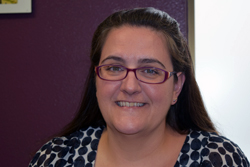
In her own case, said Poole, she is not only the district director, or administrator of the San Diego office, but she also has the responsibility of keeping Congresswoman Davis informed on the goings on in Lemon Grove, Spring Valley, and the North Park area near the office on Adams Avenue, where used book stores and antique shops abound. Additionally, she is responsible for keeping the congresswoman informed about constituents’ concerns in the areas of health care, social security, and women’s issues.
Hazard, as field director, is responsible for creating events for Davis during congressional breaks, and serves as liaison between the congresswoman and San Diego’s large military community and its biotech community. He also serves as the liaison between Davis and the Jewish community of which they are both a part.
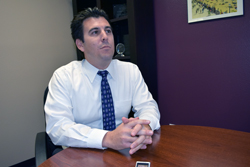
Other members of Davis’s district staff in 2105 were Lee Steuer, the senior community representative who like Hazard, had previous Washington D.C. experience; Jessica Mier, community representative; Margaret Hernandez, district scheduler; and Armita Pedramrazi, staff assistant and coordinator of Davis’s intern program. As many as six interns at time will come into the office to help answer phones, conduct research, draft letters, and to learn the ways of government, according to Poole.
Davis, elected to the Congress in 2000 after service on the San Diego Unified School District Board and in the California State Assembly, serves on two committees in Congress: the Armed Services Committee, reflecting the large military presence in San Diego, and the Education and the Workforce Committee, reflecting her service on the San Diego Unified School District’s board as well as her experiences as director of the Aaron Price Fellows Program, which as stated on its website, came about as follows:
The Aaron Price Fellows Program was created in 1991 by the Price Family to honor the life of their son, grandson, and brother, Aaron. Every spring, a class of 9th grade students from four public high schools is selected for a three year journey that includes an “up close and personal,” behind-the-scenes look at government, business, non-profit and cultural institutions. The goals of the program are to: foster friendships between Fellows from diverse ethnic, religious and economic backgrounds; teach Fellows about government, cultural, business and non-profit institutions to illustrate their significance and relevance in their lives; and expose Fellows to exciting career opportunities.
One of the graduates of that program was Todd Gloria, who went on to serve on Davis’s staff, eventually becoming her district director, before setting out upon his own political career. He won a seat on the San Diego City Council, and in the wake of a sexual harassment scandal that drove Mayor Bob Filner out of office, Gloria also served as the city’s interim mayor until Filner’s replacement, Kevin Faulconer, could be elected. As of this writing in 2015, Gloria was a candidate for a seat in the state Assembly.
Davis has long been active in San Diego’s Jewish community, worshiping at Congregation Beth Tefilah, which subsequently merged with Adat Ami Synagogue to become Ohr Shalom Synagogue (Conservative). She later joined Temple Emanu-El (Reform) and she often attends community events. I remember seeing her and her husband, Dr. Steve Davis, in the audience at one speech given at the Melvin Garb Hillel Center at San Diego State University, and they were unsuccessfully coaxed to leave seats in the middle of the room to take places of honor in the front of the audience. She tends to shy away from such perks of office, preferring to introduce herself as “Susan” rather than as “Congresswoman Davis,” and, so Poole told me, preferring to sit along the side of a conference table rather than at its head, when she holds meetings whether with staff or visiting groups.
Hazard told me that Davis “engages with the wide diversity of groups and opinions” in the Jewish community. “Not everyone has the same views, obviously, so she talks to AIPAC, she talks to J Street; she will go to Hillel and talk to people on a regular basis, and people come to see her from the Jewish Federation and Middle East advocacy groups,” Hazard added. “People see her as a leader, not just for the local delegation from here, but she is also a senior member of Congress.”
Given the polarization in the Jewish community over Middle Eastern issues, including the nuclear pact with Iran, I asked how Davis manages to stay friendly both with AIPAC and J Street — with AIPAC generally more supportive of the policies of Israel’s government under Prime Minister Binyamin Netanyahu and J Street generally more opposed.
“She understands the positions of both sides, and she starts from a position of respect from both sides, so I don’t think that she has to prove one thing or another,” Hazard said. “I think they know where she stands in terms of supporting Israel, supporting U.S. diplomacy, and supporting the President, as appropriate. When you start from that position, it is easier to stay in favor with both sides. People see her as trusted and someone who has the best interests of American security, Israeli security and human rights at heart.”
Poole said that Davis, whatever the issue, “has a reputation of listening and she listens to all sides. She is very deliberate before she takes a position. Even at the end of the day, if a group doesn’t agree with her, if she has given them time and consideration, it can help.”
The physical configuration of Davis’s offices offers some insight into how business is conducted. In the reception area, where CSpan coverage of meetings of the House of Representatives plays on a monitor, there are small desks where visitors needing help dealing with one federal agency or another can fill out papers under the helpful guidance of Pedramrazi. Off the reception area is a short hallway in which there is a private office for Davis to use when she is in the district — although, according to Poole, she prefers to work in the staff room.
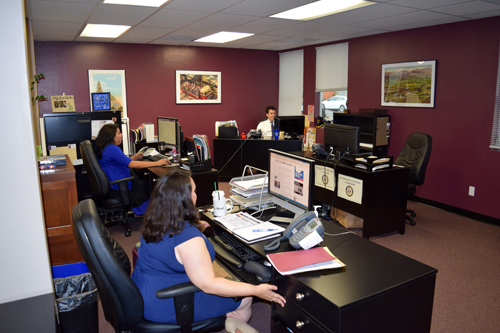
Davis utilizes her modest private office or the conference room only when meetings with constituents so dictate; otherwise she likes to work at one of the desks in the open-floor-plan staff room, in which staff members face each other in a circle and throw out questions to one another as necessary.
Poole, having previously worked for U.S. Senator Barbara Boxer, joined Davis’s staff as soon as she took office in January 2001. As a Davis staffer, she worked under other district directors until she, herself, became one in 2008. Hazard, after graduating UCSD, moved to Washington D.C., obtaining a staff job with Davis in which he first “shadowed” senior staff, and later was assigned responsibility for liaising with the Department of Defense (DOD) — an important assignment given Davis’s position on the Armed Services Committee. He obtained a master’s degree at the National Defense University, which is sponsored by the Department of Defense.
Defense issues with which Hazard dealt included strategy concerning such Middle East players as Iraq, Hezbollah, and Iran, so foreign policy in the Middle East became a natural extension of his responsibilities. But after seven years in Washington, Hazard elected to return to San Diego to raise his young family. Having him and Steuer on the district staff, with their previous Washington experience, makes communication between the two offices even more efficient, said Poole.
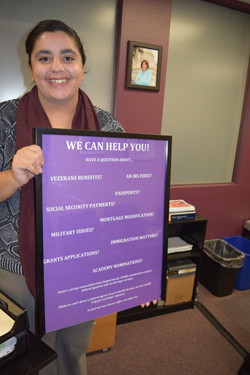
An important portion of the district office’s work is helping constituents deal with federal agencies, ranging from the Social Security Administration, to the Veterans Administration, to the various Cabinet-level secretariats of the Executive Branch.”The case work we do is like the social work function of the office,” said Poole. “We receive a lot of requests from people who need assistance with a federal agency, or sometimes with local matters as well. If it is a federal agency, we contact that agency and try to get the matter resolved for them.”
Asked what makes for a smoothly functioning district office, Hazard answered: “I think it starts with the member, the elected official, they set the tone for their offices. In my experience, it’s true in Washington and it’s true here. When you start with someone of Susan’s caliber and dedication to constituents, it is easy to follow in her path. We know what we are supposed to be doing. Everyone is passionate about public service; you don’t have to prod anyone to go out and help people.”
Noting that the staff refers to itself as “Team Davis,” Poole recalled that the first time she met her boss, she was being interviewed by the congresswoman and others. “I felt like I was the only person in the room, the way she acts with individuals. Her focus is on people. She is listening. That carries over and sets the tone, how she works with people, how we try to work with people.”
Working with people was one of the important criteria for where the district office is located. “We wanted something that was accessible for the community, so being in a neighborhood was a great option for that,” Poole explained. “It is very central to the district as well. And if you spend any time here, it is very well traveled both in terms of traffic and pedestrians. It is very open, like a storefront, and we wanted people to feel free to stop by and access our services.”
Articles dealing with Jewish women in Congress are sponsored on San Diego Jewish World by Laura Galinson in memory of her father, Murray Galinson.
*
From Texas Avenue exit, proceed south on Texas to a left turn on Madison Avenue, followed by a left turn on Oregon Street. Office is on northeast corner of the intersection of Adams Avenue and Oregon Street.
Next: Synagogues on the Move
*
Harrison is editor of San Diego Jewish World. You may comment to donald.harrison@sdjewishworld.com or post your comment on this website, provided that the rules below are observed.
__________________________________________________________________
Your comment should be followed with this information: Your full name, your city and state (or country) of residence. Letters lacking such information will be automatically deleted. San Diego Jewish World is intended as a forum for the entire Jewish community, whatever your political leanings. Letters may be posted below provided they are responsive to the article to which they are affixed, and civil in their tone. Ad hominem attacks against any religion, country, gender, race, sexual orientation, or physical disability will not be considered for publication. There is a limit of one letter per writer on any given day.
__________________________________________________________________
Pingback: Newport Antique Mall San Diego | auctions - antique auctions list